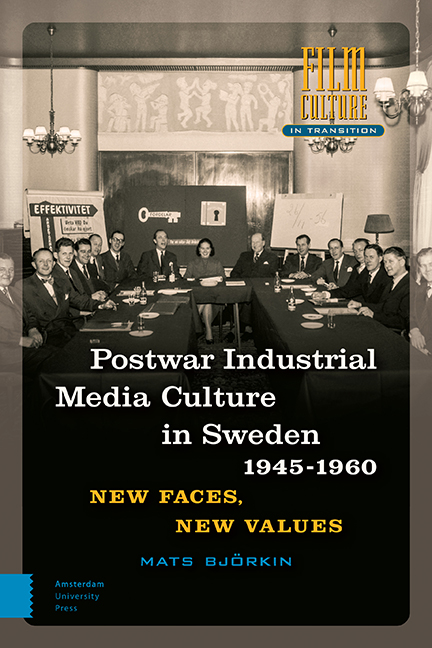Book contents
Summary
Abstract
In Chapter 4, The New Face is put into the context of Vattenfall's promotional and community-building activities around the construction sites as well as its corporate ethnographic and quantitative storytelling.
Keywords: propaganda, corporate communities, public relations, film analysis
State-owned Vattenfall, the Swedish hydroelectric power agency, was undoubtedly the major commissioner and producer of corporate media in Sweden during the 1950s. It had the resources and competence and was pursuing a purpose. During the interwar period, Vattenfall had “tested” its communication skills, and quite often it failed.
Vattenfall had for decades developed a special skill to deal with controversies. And it needed that skill. As a governmental agency responsible for the exploitation of Swedish rivers, particularly in the north, it not only became a tool for state-funded industrialization and economic development, but also a gauge of people's attitudes towards nature and technology. Vattenfall had to navigate through the growing environmental critique of hydroelectric power, the awareness of its consequences for the indigenous Sami people, and tourists’ concern about the hydroelectric threat to the beauty of the north. For most people, rivers were beautiful, dams and power plants were not.
Over the years, our company has become quite large. Unfortunately, the personal contact easily suffers when a company reaches a certain size. Especially at a company like ours, with many workplaces spread practically all over the country, it is difficult to maintain desired contact and inform everyone about what is happening.
We are all dependent upon good cooperation, and this cooperation is a prerequisite for the agency to serve its purposes. But in order to cooperate, one must first and foremost know and understand each other. Well-being and job satisfaction are values that we must protect.
It is against this background I support a company journal. For a long time I had in mind that we should have one. When the question was raised at the first meeting of the central work council, I was also met with a gratifying, unanimous response. The board supported the journal plans unanimously, and appointed contact persons to assist in the implementation. The board of directors can thus be said to have “sponsored” the journal, and its programme is fully in line with the aims of the board of directors.
- Type
- Chapter
- Information
- Postwar Industrial Media Culture in Sweden, 1945–1960New Faces, New Values, pp. 155 - 182Publisher: Amsterdam University PressPrint publication year: 2021

